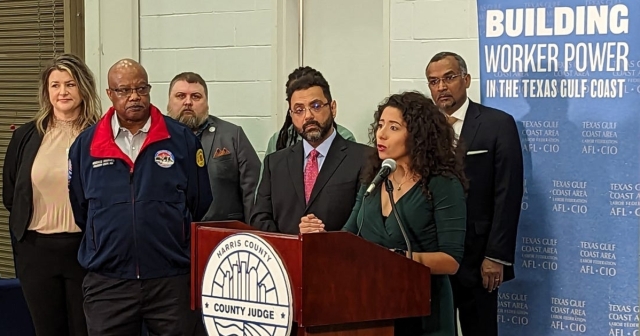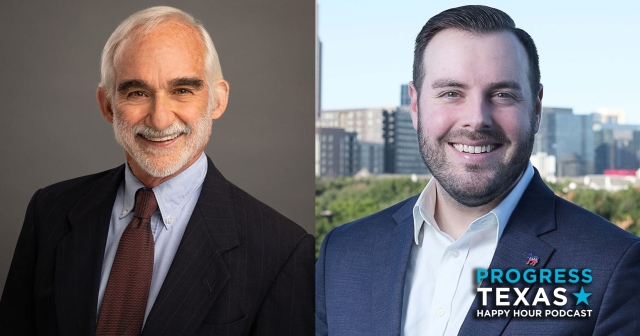UPDATE - Amendment Withdrawn. ORIGINAL - Rep. Lon Burnam Passes Amendment to Provide Guidance on Medicaid Expansion
UPDATE - Texas Tea Party conservatives, scared of primary voters, determined that their common sense vote to support guidelines for Medicaid expansion - not expansion itself, but guidelines - went too far for their primary race. The vote was reconsidered in the House, and Texas conservatives forced a "re-do" of the vote. Rather than force a "no" vote, Rep. Burnam pulled the amendment so that the House-Senate conference committee could still discuss the Sen. Williams amendment, which closely mirrored the House's version.
Of interest - there are dozens of Tea Party conservatives who believe they are smarter than the chambers of commerce, economists, hospital groups, trade organizations, and health care nonprofits who support the expansion.
Our original post is below.
During debate on the Texas House floor over the budget, State Representative Lon Burnam (D-Fort Worth) passed an amendment that provides guidance for how the state could pursue Medicaid expansion. The amendment was passed with the help of Rep. John Zerwas, the House Republican who is the point-person for Medicaid in the Texas budget. The Medicaid amendment closely tracks what was passed by Senator Tommy Williams in the Senate version of the budget - the big differences being:
- Co-pays are on the expansion population, not on the existing Medicaid population
- Any money that is calculated and saved, according to the LBB, must be put back into the state's HHSC programs.
Below is the text of Rep. Burnam's amendment, as amended by Rep. Zerwas:
Certain Medicaid Funds.
(a) Of the funds appropriated in this Act to the Health and Human Services Commission in Goal B, Medicaid and notwithstanding any other provision of this Act, no amount may be expended to modify Medicaid eligibility unless the commission develops a plan to create more efficient health care coverage options for all existing and newly eligible populations and the commission receives prior written approval from the Legislative Budget board before implementing the plan.
(b) Legislative Budget Board approval shall not be granted unless the plan satisfactorily addresses, as determined by the board, the following principles;
(1) the reduction of uncompensated costs;
(2) the promotion of the use of existing private coverage and employer sponsored coverage;
(3) the establishment of wellness initiatives
(4) the development of cost-sharing initiatives for newly eligible populations that require a recipient to pay a copayment, deductible, premium payment, or other cost-sharing payment;
(5) the creation of pay-for-performance initiatives;
(6) the creation of customized benefit plans for defined populations within Medicaid;
(7) the promotion of health savings accounts;
(8) the encouragement of individual responsibility
(9) the achievement of efficiency, including containing cost growth and improving the coordination of care within Medicaid;
(10) the reduction of non-emergency visits to emergency rooms for patients who can access services in other settings; and
(11) the reduction of the need to gain federal approval for minor changes to the state Medicaid plan.
(c) If the Health and Human Services Commission modifies the eligibility in accordance with a plan developed under this section:
(1) the Legislative Budget Board shall calculate the estimated resulting savings in general revenue mony appropriated by this Act in Article II and identify the agencies, goals, and strategies to which the money was appropriated; and
(2) notwithstanding Rider 12 following the appropriations to the Health and Human Services Commission or any other limitation on transfers in this Act, the amounts of money calculated by the Legislative budget Board under Subdvision (1) are transfred from the identified agencies, goals, strateges, as necessary, to the Health and Human Services Commission for the state fiscal biennium beginning September 1, 2013, to be used for health care programs operated and health care services provided by the commission or a health and human services agency.
Update: Thursday, April 4, 2013 @ 3:43 PM
The Texas Tribune reports:
In the midst of debate on the 2014-15 budget, the House quietly approved an amendment on Thursday that would open the door to negotiations on expanding Medicaid, a key provision of federal health reform. The amendment requires the Health and Human Services Commission to develop a plan to create more efficient health care options for Medicaid populations if the state chooses to draw down federal financing to expand Medicaid eligibility.
"It's a step in the right direction. In the political climate we're working in, this is as good as we can get them to do," said state Rep. Lon Burnam, D-Fort Worth, the author of the amendment. “Obviously there are some members that are not enthusiastic about Obamacare, but they don't represent a district like mine.”
...
"Today's vote moved us further away from Perry's insistence on just saying 'no' and closer to finding a responsible solution for expanding Medicaid and improving health care in our state,” said Philip Martin, the political director of Progress Texas, a liberal group that has compiled a list of 81 organizations in favor of Medicaid expansion.
DONATE
Your donation supports our media and helps us keep it free of ads and paywalls.








